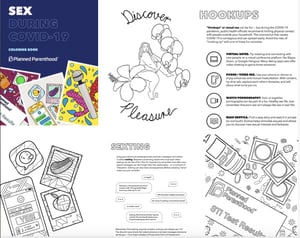| All illustrations by Jesus Abraham Morales Sánchez for Planned Parenthood of Southern New England. |
A large-breasted woman perches on a raft of orchids, her hair falling around her shoulders. Her legs spread slowly; her eyes are closed. A small, neat bottle of lubricant sits at her feet like an offering. It doubles as an artist’s signature.
Welcome to Sex During COVID-19, a new coloring book from Planned Parenthood of Southern New England (PPSNE) and illustrator, activist, and educator Jesus Abraham Morales Sánchez. The project is intended to provide a creative, educational resource on masturbation, digital consent, sexting, hookups, and sexually transmitted infections (STIs) in an era of quarantine and social distancing.
“We were really thinking about, what is something that would appeal to people right now,” said Morales Sánchez, who teaches in PPSNE’s peer-led STARS (Students Teaching About Responsible Sexuality) program. “With COVID-19, a lot of people are trying to stay occupied. As educators in my department, we’re trying to make sure that this information is accessible to folks. It’s a fun way for visual learners to have access to this information as well.”
 The book came largely out of conversations Morales Sánchez was having with both PPSNE colleagues and his STARS students, who were navigating an increasingly digital world even before COVID-19. After the program went virtual in March, he noticed more questions around sex and the pandemic, from the safety of physical intimacy to the ins and outs of digital consent to whether or not COVID-19 was an STI.
The book came largely out of conversations Morales Sánchez was having with both PPSNE colleagues and his STARS students, who were navigating an increasingly digital world even before COVID-19. After the program went virtual in March, he noticed more questions around sex and the pandemic, from the safety of physical intimacy to the ins and outs of digital consent to whether or not COVID-19 was an STI.
Students were also balancing a very different question: how to stay occupied in the midst of a public health crisis. From afar, he watched as they struggled with distance learning, mourned cancelled proms, took on new responsibilities at home, and tried to come to terms with drive-through graduation ceremonies or no graduation at all. He thought about the number of families cooped up at home, waiting to have conversations around sex education.
“A coloring book is a good entryway into that conversation,” he said. “There are erotic coloring books, and this is not what that is. We should be trying to enable as much as possible the opportunity for parents to have that open communication with their kids, and for students to have that conversation with their friends.”
In the book, he has provided six illustrations, each of which come with an accompanying page of information, memory tricks, and acronyms that he uses with his students. There is FRIES, for instance, when talking about consent: Freely Given, Reversible, Informed, Enthusiastic, and Supportive. The acronym is spelled out with patterned, blocky first letters waiting to be colored in.
In keeping with best public health practices and the realities of physical distancing, the coloring book focuses on self-pleasuring and informed, long-distance consent, rather than physical intimacy. Planned Parenthood isn't alone: the New York City Health Department recently reminded residents that “you are your safest sex partner,” followed by a consenting partner that lives in the same household.
On one page, three patterned emojis bounce against a white background: a face blowing kisses, ornate, ripe eggplant and dainty, heart-shaped piece of stone fruit. A phone comes to life beside them, with a text exchange between two sext-ready, consenting partners. The word “Yes!” is spelled out in big, exuberant letters.
On another, dedicated to STI identification, symptoms, and testing, an array of tiny parasites and bacteria crawl across the page, seemingly ready to wreak havoc on their host. Today is not their day: a bottle of PrEP (Pre-exposure prophylaxis) floats upside down, two pills spilling from its mouth. Three condoms, layered on each other like playing cards, bend in a gentle, reverse C-shape nearby. A folded piece of paper advocates confidential testing.
“In general, we hope that the project helps people to be more informed, and to make informed decisions about their body and their sexuality,” he said. “There are ways that we can practice social distancing and still be sexual beings. We’re reconciling that sexuality with the current crisis. Along with it, we’re hoping that they can learn.”
In addition to the coloring book, he and his STARS students created an online teen night, where teens were able to ask sex-related questions and get answers from their peers. He praised them for taking on questions that ranged from whether COVID-19 could be transmitted sexually to sending and receiving sexually explicit text messages.
Emily Kopstein, a STARS student who is a senior at the Educational Center for the Arts (ECA), said that she has seen a shift in the questions she’s getting. Prior to COVID-19, she was having conversations around abortion, birth control, and access to hormones for trans, undocumented state residents.
Now, fewer teens are likely to access the organization’s Whitney Avenue location, despite the fact that it has remained open. She’s found herself fielding more questions about birth control as many of her peers to college, including what type may be best (for women, for instance, that conversation includes oral versus intrauterine contraception).
She added that sometimes her peers stop short of asking about masturbation and sex toys, because “those questions are often the hardest to ask.” To answer them, she’s been using digital space—particularly Instagram and Snapchat—because she knows her peers are already using it.
“We definitely make sure to have those discussions,” she said. She added that some of her peers still ask whether they should be having sex and physical contact during the pandemic, to which “I usually say, I would encourage you not to.”
To access the coloring book, click here.